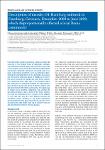Description of measles D4-Hamburg outbreak in Hamburg, Germany, December 2008 to June 2009, which disproportionally affected a local Roma community
Hegasy, Guido
Kätzner, K.
Helle, M.
Mankertz, Annette
Baumgarte, Sigrid
Wille, A.
Fell, Gerhard
From December 2008 to June 2009 a measles outbreak occurred in the Federal State of Hamburg, Germany. The outbreak affected 216 persons and was caused by a new measles strain termed D4-Hamburg which led to consecutive outbreaks between 2009 and 2011 in at least 12 European countries. Here, we describe epidemiological characteristics of the outbreak and evaluate the control measures taken in Hamburg. In one of the seven boroughs of Hamburg a local Roma community comprised more than 50% of the notified cases. We compared in a stratified analysis the age distribution of these cases with cases of fellow citizens who did not belong to the Roma community. The age group of infants (0-11 months) comprised 33% among the non-Roma measles cases, while in the Roma community only 4% belonged to this stratum. In the stratum of 5-17 year-olds only 8% were affected among the non-Roma cases, whereas in the Roma community 50% belonged to this age group. We discuss the influencing factors that might have led to this difference in age distribution between the two groups.
No license information

